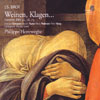Bach Cantatas Nos 12, 38 and 75
Herreweghe continues his cool but eloquent approach to Bach
View record and artist detailsRecord and Artist Details
Composer or Director: Johann Sebastian Bach
Genre:
Vocal
Label: Harmonia Mundi
Magazine Review Date: 4/2005
Media Format: CD or Download
Media Runtime: 69
Mastering:
Stereo
DDD
Catalogue Number: HMC901843

Tracks:
| Composition | Artist Credit |
|---|---|
| Cantata No. 12, 'Weinen, Klagen, Sorgen, Zagen' |
Johann Sebastian Bach, Composer
Carolyn Sampson, Soprano Daniel Taylor, Alto Ghent Collegium Vocale Johann Sebastian Bach, Composer Mark Padmore, Tenor Peter Kooy, Bass Philippe Herreweghe, Conductor |
| Cantata No. 38, 'Aus tiefer Not schrei ich zu dir' |
Johann Sebastian Bach, Composer
Carolyn Sampson, Soprano Daniel Taylor, Alto Ghent Collegium Vocale Johann Sebastian Bach, Composer Mark Padmore, Tenor Peter Kooy, Bass Philippe Herreweghe, Conductor |
| Cantata No. 75, '(Die) Elenden sollen essen' |
Johann Sebastian Bach, Composer
Carolyn Sampson, Soprano Daniel Taylor, Alto Ghent Collegium Vocale Johann Sebastian Bach, Composer Mark Padmore, Tenor Peter Kooy, Bass Philippe Herreweghe, Conductor |
Author: Jonathan Freeman-Attwood
Philippe Herreweghe’s Bach journey is unusual in not forming part of a complete edition. Rather, Collegium Vocale select – usually annually – a theme or feast through which to reveal Bach’s transcendental way with a particular liturgical idea. The three works here deal with lamentation and the eventual solace of the Cross. The ‘title’ cantata is Weinen, Klagen (No 12), an early work from Weimar brimming with gestural angst, from the captivating melisma of the opening oboe sinfonia to the choral lament which was to become the ‘Crucifixus’ of the Mass in B minor. Herreweghe conveys the sense of human struggle with his usual supreme attention to words and textural coloration, if without an emotionally charged presence. The individual movements combine to allow Bach’s restorative arias to glow (especially a splendid ‘Ich folge Christo nach’ from the ubiquitous Peter Kooy).
The same can be said for the austere antiquity of Aus tiefer not (No 38) where one basks in the satin timbre of trombones and voices in funereal relief to the granite blocks of the chorale’s mighty phrases. Exquisitely managed by Herreweghe, it is enhanced significantly by the ‘fulcrum’ aria, ‘Ich höre mitten’, where tenor Mark Padmore conveys the idea of comfort rising from the river of sorrow with tonal refinement and eager intent.
The main cantata, Die Elenden sollen essen’ (No 75) is the bipartite work with which Bach inaugurated his Leipzig career. Not surprisingly, with its ambitious, modern-sounding score and lyrical arias, it found favour with the burghers of Leipzig – nothing too arcane or academic for Bach’s first outing. Ton Koopman’s reading emphasises the exultant instrumental canvas where Herreweghe’s quest for smooth, cool and unadulterated beauty leaves one strangely bereft.
His renowned ear for colour finds its mark in the superb aria ‘Mein Jesus soll mein alles sein’ where Padmore, in the phrase ‘the sweetest of all wines’, harnesses the image through telling control and coloration. Carolyn Sampson irradiates ‘Ich nehme mein Leiden’ though Daniel Taylor seems too often to force the sound and prevent his pleasing timbre to settle. In total, Bachians will find much to enjoy here, not least because Herreweghe’s musical instincts can, at best, irradiate Bach’s line with a rare eloquence.
The same can be said for the austere antiquity of Aus tiefer not (No 38) where one basks in the satin timbre of trombones and voices in funereal relief to the granite blocks of the chorale’s mighty phrases. Exquisitely managed by Herreweghe, it is enhanced significantly by the ‘fulcrum’ aria, ‘Ich höre mitten’, where tenor Mark Padmore conveys the idea of comfort rising from the river of sorrow with tonal refinement and eager intent.
The main cantata, Die Elenden sollen essen’ (No 75) is the bipartite work with which Bach inaugurated his Leipzig career. Not surprisingly, with its ambitious, modern-sounding score and lyrical arias, it found favour with the burghers of Leipzig – nothing too arcane or academic for Bach’s first outing. Ton Koopman’s reading emphasises the exultant instrumental canvas where Herreweghe’s quest for smooth, cool and unadulterated beauty leaves one strangely bereft.
His renowned ear for colour finds its mark in the superb aria ‘Mein Jesus soll mein alles sein’ where Padmore, in the phrase ‘the sweetest of all wines’, harnesses the image through telling control and coloration. Carolyn Sampson irradiates ‘Ich nehme mein Leiden’ though Daniel Taylor seems too often to force the sound and prevent his pleasing timbre to settle. In total, Bachians will find much to enjoy here, not least because Herreweghe’s musical instincts can, at best, irradiate Bach’s line with a rare eloquence.
Discover the world's largest classical music catalogue with Presto Music.

Gramophone Digital Club
- Digital Edition
- Digital Archive
- Reviews Database
- Full website access
From £8.75 / month
Subscribe
Gramophone Full Club
- Print Edition
- Digital Edition
- Digital Archive
- Reviews Database
- Full website access
From £11.00 / month
Subscribe
If you are a library, university or other organisation that would be interested in an institutional subscription to Gramophone please click here for further information.




